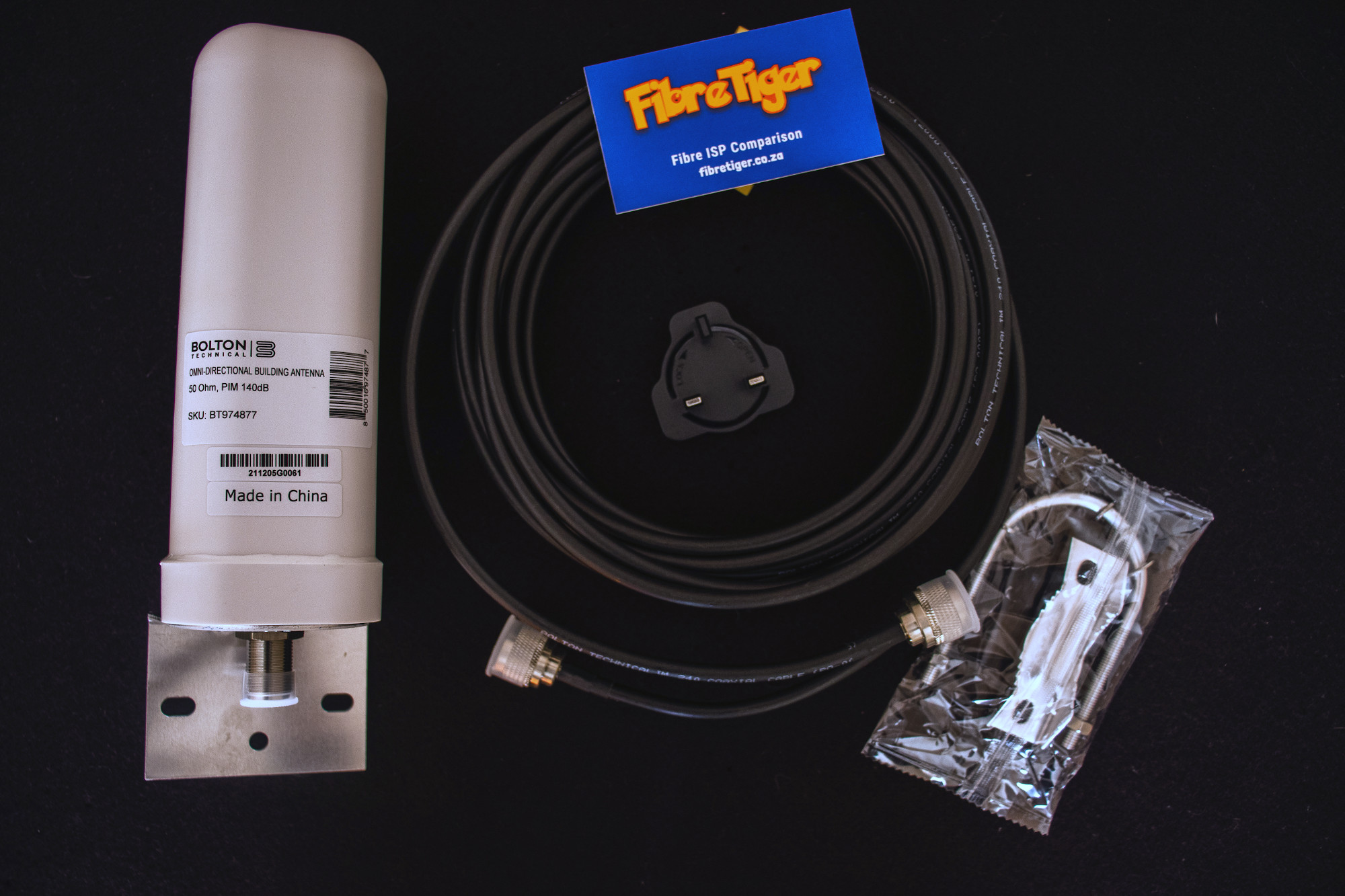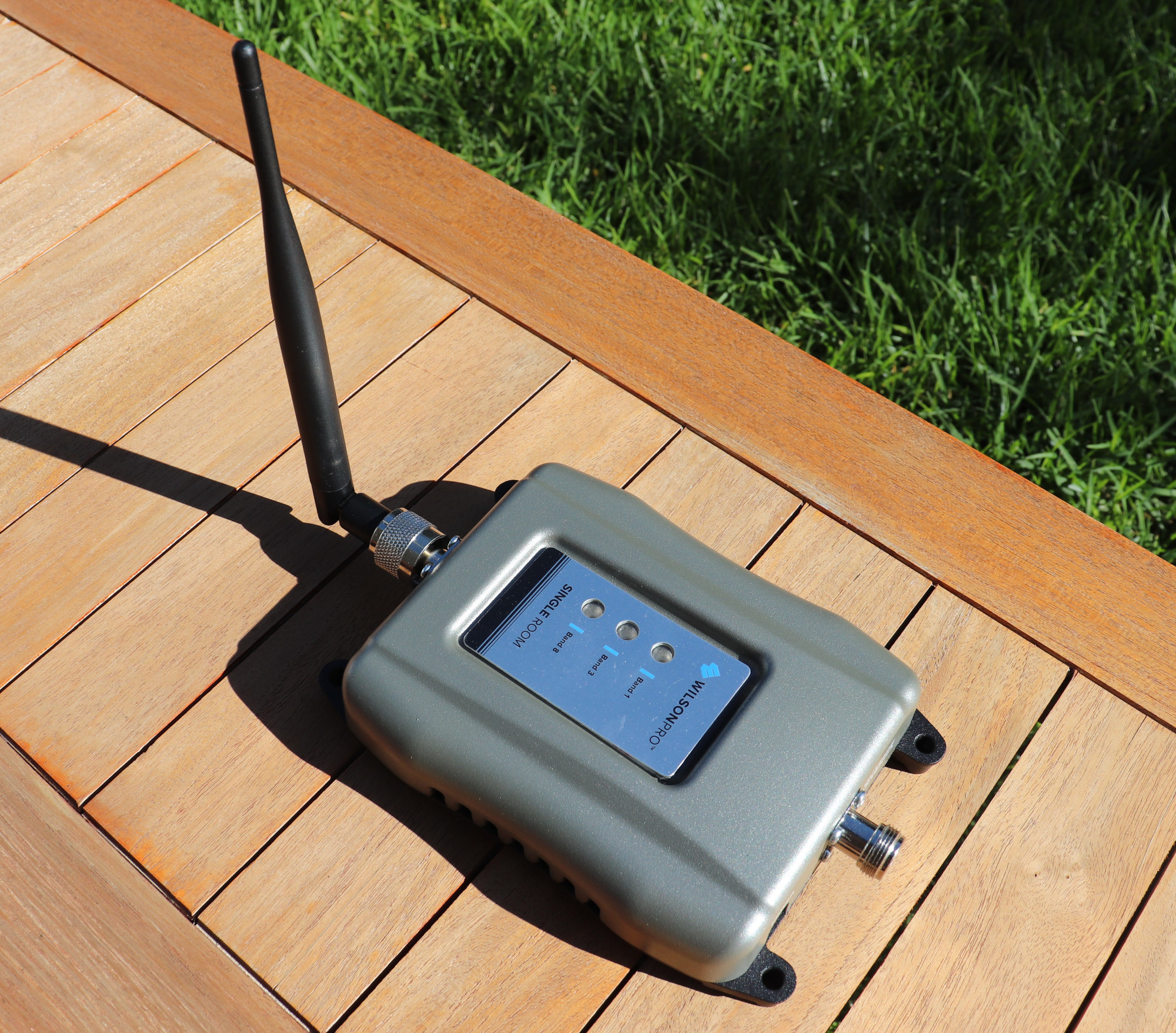4G / LTE Signal Boosters - A Practical Solution
Jacques du Rand 2022-07-29
Slow speeds, Bad reception. What causes poor LTE signal strength?
If you are one of the unlucky people that does not yet have fibre internet coverage then you might be stuck with a 4G / LTE connection from Telkom or MTN as the only alternatives. In addition you might also suffer from bad cell phone reception.
These types of wireless (not WiFi) internet solutions does work, but because of its wireless nature compared to something like fibre or ADSL which has a "fixed physical copper or optical line" right to your doorstep, wireless internet will always be slightly to a lot worse in terms of speed, reliability and pings-times (latency).
The reason is simple. The "airspace" or electromagnetic spectrum (radio waves section) is a shared space. You share it with your neighbour and everyone else connected to the same cell tower or within your immediate vicinity.
No Signal - Just Tell Me How To Fix It Quick !
We understand, your internet is so bad you couldn't even download the rest of this article, if the internet deities have sent you just enough signal to get this far, just go ahead and buy the Bolton LTE/4G Signal Booster.
In short, it works fantastically and is built like a tank and stops the buffering !
Wired VS Wireless Communications - Shouting In Shared Spaces
Think of wireless communication as you standing on your "stoep" and shouting" to your neighbour your favourite pizza recipes and Eskom profanities. That works as long as no one else is standing on their stoep trying to communicate their love of Eskom or pizzas with their neighbours and cell towers.
If suddenly you have 10-20 people trying to "communicate" at the same time, the shared space becomes one of the limiting factors. It just gets too busy and noisy for everyone to communicate at the same time.
Bad Weather
Now imagine all of this "time-sharing communicating" and throw in some bad Cape Town weather, suddenly the amount of communication you can do is even less.
With a wired (read dedicated) connection like fibre or ADSL, you have a dedicated last-mile physical cable that only YOU have access to and does not get interfered with by your neighbour or the bad weather.
DISCLAIMER: Yes, there is some sharing of the upstream infrastructure, but the efficiency is still a lot better with wired channels.
Distance: You can only shout so loud and then there are rules.
The last big issue with any wireless communication is that you can't communicate very far. Referring to our example of the shouting man on his stoep: Even if he shouts at the top of his lungs his message will only travel so far.
In addition the rules set forth by ICASA (airspace police) limit how strong your "signal" (a.k.a shouting volume) is allowed to be. Thus your wireless experience will be artificially limited as well.
With a wired or dedicated channel, you don't really have these limitations since you have your own hard-line.
LTE: Is It Worth It in The End ?
Actually yes, very much so ! Even if you just use it for a backup solution to your Openserve or Vuma fibre line.
Also come loadshedding with LTE you only need to keep power to the LTE/WiFi device which is usually one single device. Compared to say fibre which has a ONT and WiFi component.
What About WiFi ?
WiFi is not the internet! WiFi is how we "distribute or share" the internet (that is already at your house) to the rest of the house.
Fibre/ADSL/LTE/4G are the different options and how 90% of South Africans get their internet delivered to their front door.
Notice WiFi is not amongst them. Once the internet is through the door, we use WiFi to share that internet inside the house to the rest of the family, phones and streaming services like NetFlix and Disney+
Yes, WiFi is also wireless and has some of the same problems as LTE/4G, but because your WiFi is, in most cases, only competing for the shared airspace inside your own home and not your neighbours home, it is less of a problem (although if many houses with many routers are too close to one another you could also have problems).
That is why every time your fibre connection is getting slow and you start to buffer Star Trek episodes, your ISP call centre agent's very first step will be:
"Please do another speed test WITH A CABLE connected to the router (WiFi)"
Solution: LTE / 4G Signal Booster
So what are the options ? You wait for a fibre network like Vumatel or Openserve to come to your neighbourhood, but it can take a long, long time.
A better and faster solution will be to use a signal booster and install it at your house.
What Is A Signal Booster ?
It's kind of portrayed in the name, right? - Signal Booster !
Think of the signal booster as a person sitting on your roof with really, really good hearing and pronunciation. This mythical person is a finely tuned piece of modern digital signal processing and RF tricks to pick out the very faint signals, clean it up and pass the original message down to your LTE Router or cellphone. It works in reverse when you send out your signals, or erm "shouts".
WilsonPro Single Room Cell Phone Signal Booster - Review
We received the single room kit to review from Bolton Technical and we couldn't be more impressed !
What's in The Kit
1 x Antenna - For outside
1 x Signal Booster Unit
1 x Power Supply
1 x 8 metre coaxial cable (no you can't use your TV antenna cable)
1 x Whip Antenna (for inside)
1 x Fasteners Kit (U-Clamps and Screws)


There are two external antenna options:
- Omni-directional
- Yaggie (directional)
The internal antenna also comes in a whip or panel configuration in the A500 kit together with a higher spec antenna cable (LMR 400) which is more suited for multiple rooms and bigger spaces
Build quality
I can't stress enough the great build quality of the device and accessories. The phrase "built like a tank" is really appropriate here.
Specifications
The actual signal amplifier works on the following frequencies and has a handy LED light to showcase its working
| Band | Frequency |
| Band 1 | 2100 MHz |
| Band 3 | 1800 MHz |
| Band 8 | 900 MHz |
According to the spec sheet:
With up to +70 dB gain of power, it greatly enhances 4G LTE and 3G cell service for all your wireless cellular devices
Installation
This was super easy, we only had to connect the external and internal antenna both of which were simple screw-on. You want to mount the external antenna as high as possible and we found our now defunct and unused DSTV Dish point to be excellent for this.
Great Service
We had some dealings with Bolton Technical on several occasions and their service has never been anything but excellent, friendly and more importantly knowledgeable !
96 Hour Signal Test
We really wanted to test the unit and application over an extended period of time, not just a once-off signal test. So we did a 4-day test with battery backups (so loadshedding wasn't an issue).
Test Setup
We configured a Raspberry PI (small computer) that was connected to our Huawei LTE B525 Router and scheduled a script to read the signal strength from the router every hour.
Every 24 hours we would flip the signal booster off or on and take new signal readings
Thus we have two days of signal data WITH the booster and two days of data WITHOUT the booster.
It should be noted that while this test was in progress no other devices apart from the Raspberry PI was making use of the Huawei B525 router or network.
The rest of the office was using the usual solid Openserve / Vox fibre internet connection on a completely different network.
Signals Strength Basics
The de-facto method to measure "signal strength" is the SNR Metric (Signal To Noise Ratio)
Think of it as a "more accurate" way to measure your reception strength than the usual
"how many bars do I have on my phone".
Signal to Noise Ratio (SNR)
The signal-to-noise ratio (SNR) is the power ratio between the signal strength and the noise level.
This value is represented as a +dBm value.
Higher is better !
Results
On average we saw anything from 15% - 28% increase in SNR with the Booster ON.

Conclusion
The results are clear, the Bolton LTE / 4G Signal Booster clearly improves the signal (SNR) and is an excellent solution for when you are struggling with slow internet because of bad signals !

